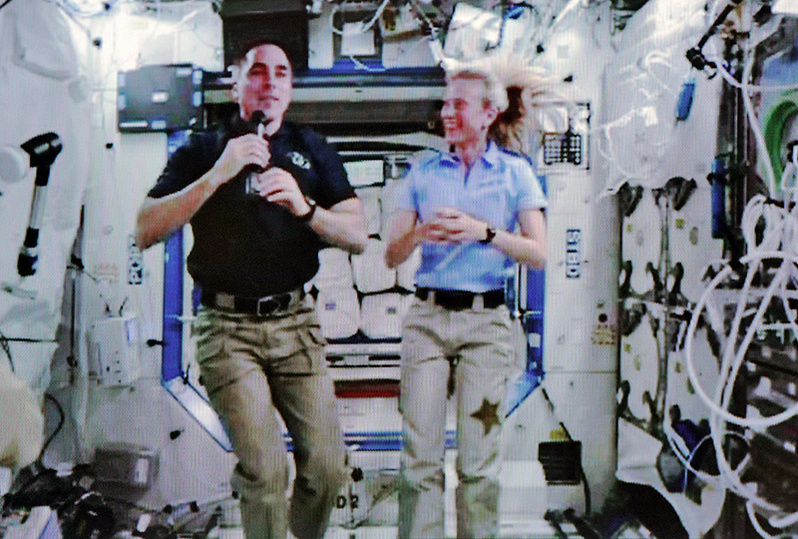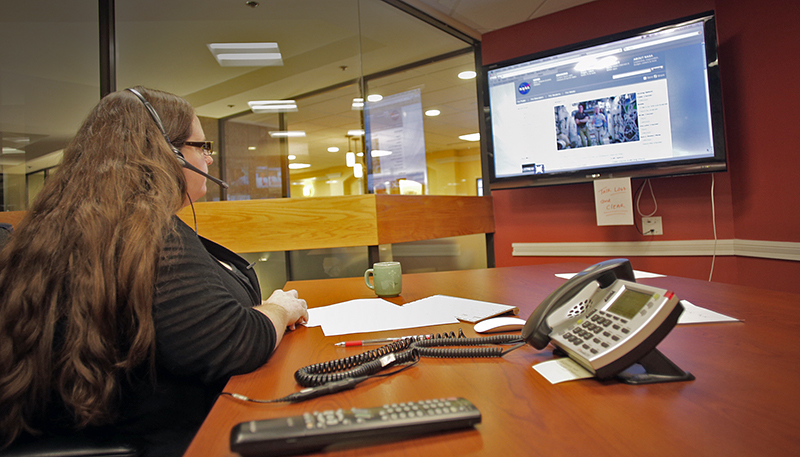When his colleague’s helmet began to fill with water during a recent spacewalk, astronaut Chris Cassidy knew he had to react quickly.
About an hour into a planned 6½-hour foray into space on July 16, Italian astronaut Luca Parmitano realized there was water creeping in around his neck, which could have gotten into his mouth or eyes, Cassidy said Thursday morning from aboard the International Space Station.
NASA quickly aborted the spacewalk, and with Cassidy’s help, Parmitano made it back into the space station and was reported to be fine after the dangerous episode.
Cassidy, who grew up in York and still has family in Maine, and fellow astronaut Karen Nyberg spoke to the Portland Press Herald via video conference Thursday as the space station passed over Texas.
They talked about life in space, staying in touch with their families, scientific experiments, and less weighty things such as washing hair in zero gravity and missing the smell of freshly cut grass.
Cassidy also spoke about the dramatic spacewalk that made international news this month.
He held his colleague’s helmet Thursday to demonstrate where the water collected around Parmitano’s head, threatening his hearing and his sight — necessities when you’re walking in space.
“Through a series of tests, we realized it wasn’t sweat or any other bodily fluid,” Cassidy said.
It was quickly clear that the helmet needed to be removed before the liquid suffocated Parmitano, although NASA officials said later he was not in immediate danger.
Cassidy said Thursday that it was fortunate they were near the airlock that allows them back into the space station when the malfunction happened, although they did have to separate for a short time because their safety tethers were connected at different points on the station. Nyberg and their Russian colleagues were able to help the spacewalkers safely back into the station without any further problems, Cassidy said.
Although spacewalks are known to carry risks — that’s one reason astronauts work in pairs when outside the station — it was the first time since NASA’s Gemini program in the 1960s that a spacewalker was so incapacitated. It was the second-shortest spacewalk in space station history.
A panel of experts is looking into what caused the unprecedented leak that allowed 34 to 51 ounces of water into Parmitano’s suit.
Cassidy, 43, is a former Navy SEAL who had been on five other spacewalks before leaving the station in his protective suit July 16.
He and Nyberg are both flight engineers on the six-person crew of Expedition 36. Cassidy arrived at the space station on March 28, and Nyberg arrived May 28. They are each spending six months in space.
While on the space station, Nyberg, 43, said the crew is working on about 150 experiments. Much of their research is focused on how being in space affects their bodies.
“We’re studying what happens to our bodies when we’re living in a microgravity environment for the future, when we travel farther from Earth or spend more time in a microgravity environment,” she said.
Cassidy and Nyberg, a Minnesota native, both have spouses and children waiting for them at home. They said they are able to email their families and talk to them through weekly video chats, and occasionally on the phone.
Nyberg also uses social media to share photos of Earth and to talk about life aboard the space station. A video of her demonstrating how she washes her hair in space has nearly 1.7 million views on YouTube. Her Pinterest includes a board called “Hair and Space” that features photos of her long blonde hair floating around her.
“One of my goals is to connect to people who wouldn’t necessarily be thinking about the space program, and I thought Pinterest would be a good way to do that,” Nyberg said.
Cassidy believes people are interested in videos such as Nyberg’s because they can relate to the everyday activities and find it fun to see how they are done in space.
He is scheduled to leave the space station in September and expects to visit Maine in November. Earlier this month, he participated in York’s Four on the 4th race from more than 200 miles above Earth.
“I was really excited to participate and include the town in my mission, and to include the state of Maine in my mission as well,” he said.
Cassidy said he misses the smell of summer in Maine: fresh-cut grass and “the unique smell of the ocean and the rocky coast.”
“That’s the sort of thing you can’t replace up here,” he said. “Those are the things I’m looking forward to getting back to.”
Gillian Graham can be contacted at 791-6315 or:
ggraham@mainetoday.com
Twitter: grahamgillian
Send questions/comments to the editors.






Success. Please wait for the page to reload. If the page does not reload within 5 seconds, please refresh the page.
Enter your email and password to access comments.
Hi, to comment on stories you must . This profile is in addition to your subscription and website login.
Already have a commenting profile? .
Invalid username/password.
Please check your email to confirm and complete your registration.
Only subscribers are eligible to post comments. Please subscribe or login first for digital access. Here’s why.
Use the form below to reset your password. When you've submitted your account email, we will send an email with a reset code.